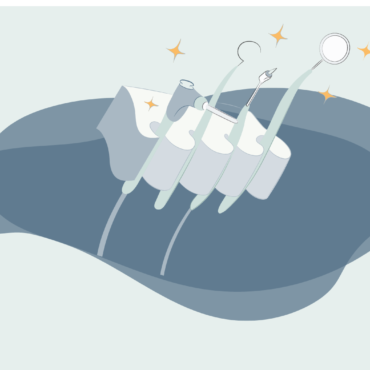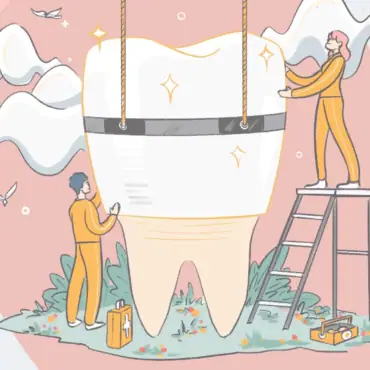A big confident smile can feel amazing. And we sure try lots of ways to make our teeth whiter. Lisa J. Baker, DDS from Bloomington says yellow and dull teeth can negatively affect your business and social life. That’s where oil pulling comes into play. This ancient practice can improve your oral health and overall wellbeing.
What is oil pulling?
Oil pulling is an ancient folk remedy, deriving from the ancient Ayurvedic medicine system from India. It allows you to improve your oral hygiene and remove bacteria by swishing oil in the mouth. The Journal of Traditional and Complementary Medicine illustrates that in pulling, you take one tablespoon of oil and keep swishing it all around your mouth and between the teeth for about 20 minutes in the morning with an empty stomach.
If you can’t commit to 20 minutes straight, consider dividing the process into two sessions of 10 minutes each. Either way, it’s important to spit it out at the end. That’s because when the oil becomes thin and milky, it’s full of harmful bacteria.
Due for a checkup?
Find a top rated dentist near you that takes your insurance.
With that said, we recommend you see a dentist to get all the facts about your dental health. While the American dental association doesn’t consider oil pulling as a reliable dental remedy due to a lack of scientific evidence, you may ask your dentist about it anyway, to help determine if it’s right for you.
Does oil pulling work?
You can find loads of scientific studies on oil pulling with its effects and benefits. We have come up with the list of most reliable sources about the oral hygiene and health of pulling. Let’s explore.
Pulling with coconut oil
- According to one study by the JNSBM (Journal of Natural Science, Biology and Medicine), using coconut oil to pull mitigates the severity of gingivitis. It’s even more effective as compared to sesame oil.
- Another study shows the importance of coconut oil pulling. The study explains that it’s as impactful as chlorhexidine, which is a strong prescribed mouthwash. Coconut oil was shown to reduce the bacteria that cause tooth decay. It also detoxes and whitens your teeth because of its naturally-occurring lauric acid
Pulling with olive oil
A study conducted at Balikesir University showed olive oil has antioxidant and antimicrobial properties, making it effective for oil pulling.
Keep in mind, professionals conducted these studies on a small scale, and they undoubtedly provided positive results about oil pulling. It doesn’t mean you should solely rely on oil pulling if you’re on prescribed medication. Moreover, if you floss and brush your teeth regularly, you can add pulling therapy with them. Again, we recommend you find an experienced dentist in order to discuss your oral health for better dental care.
Benefits of oil pulling
It kills harmful bacteria in your mouth
As you know by now, your mouth contains millions of microorganisms, especially bacteria. Some of them cause gum diseases, bad breath, and tooth decay, and also other diseases that disturb our immune system.
According to this NCBI study, oil pulling kills the harmful bacteria present in your saliva. About 60 people took part in clinical trials, and all showed pretty much the same results with improved oral hygiene (and all with coconut oil). It’s clearly a safe, healthful alternative to chlorhexidine, as it also has antibacterial properties.
It reduces bad breath
Bad breath is often caused by gum diseases, cavities, infection, tongue coating, or simply, poor oral hygiene. Bacteria buildup can single-handedly cause these problems. Another NCBI study shows that oil pulling is one of the natural ways to reduce bad breath. You can use it along with chlorhexidine mouthwash as well. It also prevents the dryness of your throat, mouth, and lips.
It prevents cavities
As mentioned, bacteria build-up can cause cavities because of excessive sugar intake. Additionally, a plaque, by forming a coating of food particles, saliva, and bacteria, can also cause cavities that damage enamel.
As oil pulling reduces the harmful bacteria from your mouth, so it indirectly prevents cavities as well. Consider adding pulling therapy to your daily routine along with flossing, rinsing, and tooth brushing for optimal dental hygiene.
And improves gum health AND reduces inflammation
Plaque contains bacteria that can cause gingivitis that leads to gum bleeding, swollen gums, etcetera. Scientific studies show coconut comes with properties that reduce inflammation. You can also use sunflower oil that comes with omega-3s, which are anti-inflammatory as well.
Oil pulling is beneficial for the overall health of your jaws, gums, and teeth. It is one of the potential holistic approaches to treat bleeding gums.
Due for a checkup?
Find a top rated dentist near you that takes your insurance.
Anecdotal benefits
Oil pulling also has the potential to minimize the symptoms of allergies. It can help minimize sinus congestion (preventing lipoid pneumonia) and combat skin conditions like eczema and acne. Finally, pulling can help enable your body to detoxify harmful microorganisms and metals.
Does oil pulling have any side effects?
There isn’t a single known side effect of oil pulling on your body. The only symptom you may experience is a mild headache, due to the rigorous motion while swishing.
And remember not to swallow the oil. It’s loaded with bacteria and can also lead to diarrhea or an upset stomach. And of course it’s always advisable to find an experienced dentist near you to have a clear idea about your current dental health.
Try oil pulling
Oil pulling is a very easy process, and you can start doing it today by following the steps listed below. If you want to gain optimal health benefits, consider doing it in the morning with an empty stomach.
- Select a quality organic oil, like coconut, olive, sesame, or sunflower
- Put one tablespoon of it in your mouth. (We recommend it first thing in the morning on an empty stomach.)
- Swish it between your teeth and all over your mouth for 20 minutes. It’s the right amount of time to break through plaque and bacteria.
- After 20 minutes, spit it out. (It will be thin and milky.) Do NOT swallow the oil; it’s full of bacteria and toxins.
- Use warm water to rinse your mouth, ensuring to remove the oily residue.
- And brush your teeth for a fresh feeling that will stick around all day.
How often should I do it?
You can do oil pulling on a daily basis if you prefer. It’s safe to do it daily but not recommended to do more than once per day.
Sign up for our newsletter.
Just let us know a bit about yourself.
Verdict
We all get only one natural set of permanent teeth, so it’s critical you take care of them. And although more research is needed, oil pulling does come with no side effects while having some proven and positive attributes. Consult with your dentist and start performing this therapy today.








